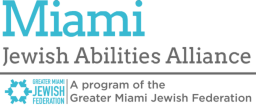Be Jewish Together
Worship is part of who we are as Jews and the Miami Jewish Abilities Alliance is dedicated to elevating all the ways we worship and celebrate our Judaism. There’s nothing about any type of disability by itself that prevents worship. Yet, holiday celebrations, community gatherings and family traditions can underline barriers to participation. Disability creates in house, in body adaptation – but isn’t that true in all families, disability or neurotypical? To some degree or another we all shape our participation to meet our family’s needs and those needs change over time and with circumstances. COVID is a strong example of adaptation. Many of us used tech to bring our families together for holidays, weddings and brit milot. Sadly, we also participated in funerals and mourning via Zoom. Yet, we participated. We were there for each other, with each other. And that is what makes us a community. Holidays and shabbat enable us to step away from the ordinary and share in the extraordinary gifts of tefillah, teshuvah and tzedakah. And those gifts are open to all Jews. Realistically, holidays also force us to confront stubborn barriers and create different ways of thinking about how we worship. For some, holidays trigger anxiety, fear of judgement and underscore what is perceived as missing – just one more challenging thing on a list of challenging things. The Miami Jewish Abilities Alliance recognizes this duality of wanting to worship and facing barriers and offers these resources so you can pray, celebrate and participate in your Judaism because that’s what a community is, it’s all of us together.
Please take a look at this series of short films by Bejamin Rosloff, entitled, What I Pray For where Jews with disabilities share what prayer means to them.
Looking forward to being Jewish together.
High Holidays
The Inclusive Congregations Guide from Disability Belongs (formerly known as RespectAbility) updated September 2025, serves as a road map of sorts, offering practical tools as well as spiritual references for worship. Disability Belongs, a leader in inclusive worship, also offers step by step instruction for worship organizations seeking to be more inclusive.
Adoughma Play from Philadelphia’s Jewish Learning Venture created this excellent step by step guide for celebrating the holidays through sensory play
- The United Synagogue of Conservative Judaism (USCJ) has created this resource page to serve as a tool kit for inclusive high holiday celebrations.
- Chabad has created High Holidays Inclusive Congregation Guide.
- Rabbi Lauren Tuchman offers a new paradigm for understanding the religious import of including all within our sacred spaces. Watch her profound Eli Talk, We were all at Mount Sinai, the power of inclusive Torah.
- This substack from the Jewish Disability Network offers several articles on worship and disability.
- Beit Issie offers Issie Roots Activities for Rosh Hashanah and Yom Kippur which includes cards, holiday worship and lesson plans in English and Hebrew.
- Matan offers several guides for High Holiday and Shabbat worship.
- Gateways has created a page of links to curriculum, resources, PECS and crafts for children and teens with disabilities and diverse learning needs. Please see Gateways High Holiday resources
- The Ruderman Foundation, catalogs several inclusion programs of historical involvement and also focuses on disability representation in media.
- Resources from Jewish Interactive on Jewish holidays, Hebrew instruction, secular Jewish and Israeli culture can be found here
- Jewish Braile Institute (JBI) offers Machzorim, Jewish reference calendars, and more for High Holy Days in large print, braille, and audio formats free of charge for anyone who is blind, low vision, or print disabled. They offer editions for different denominations and in different languages. You can receive materials by mail and digitally. Please visit JBI here.

